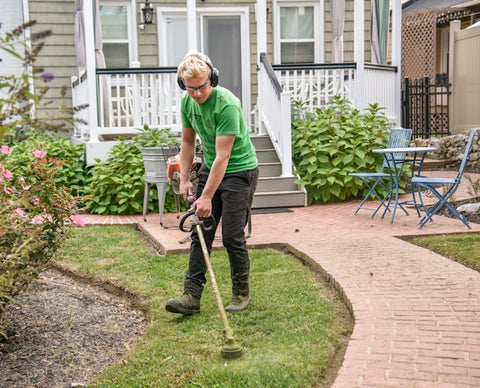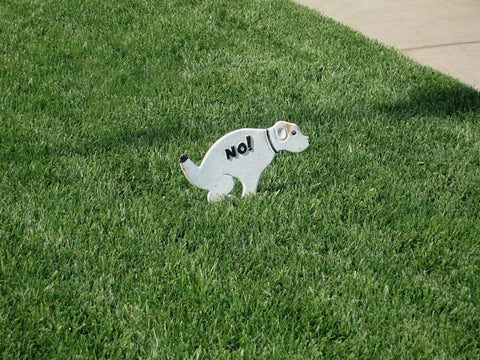- Home
- Shop
- Living
- Blog
- MIKOLITE
- SinterTech
- About
- Gallery
- Sign in
March 11, 2024
As spring turns to summer, many of us enjoy spending more time relaxing and playing outside. However, the warmer weather also makes our lawns more susceptible to foot traffic, pet activity, and other wear and tear damage. An unkempt lawn can detract from the aesthetic beauty of your home's curb appeal and lower your property value. However, with some awareness of common threats and simple preventative strategies, you can keep your grass healthy while still enjoying outdoor activities.

Today, we will explore practical tips homeowners and pet owners can use to protect their lawns from damage throughout the spring and summer months. With a little effort, your lawn can remain lush and green all season long for you and your pet to enjoy.
If you are a pet owner, then you likely know how difficult it can be to keep your lawn looking healthy and green. Dogs, in particular, can cause significant damage to lawns with their digging, running, and waste. However, there are ways to minimize the impact of our furry friends on our lawns.
The first step in protecting your lawn is to train your pet to use a designated area for their bathroom needs. This can be a specific spot in the yard or even a designated patch of gravel. Doing this lets you concentrate on cleanup efforts and prevent waste from damaging your grass.
When choosing fertilizers or pesticides for your lawn, it is essential to be mindful of the ingredients and their potential toxicity to pets. Certain chemicals commonly found in fertilizers can be harmful if ingested by our furry friends. Consider using pet-friendly options or natural alternatives to keep your lawn healthy without putting your pets at risk.
Regular mowing, watering, and aeration can significantly help reduce the impact of pet activity on your lawn. Keeping the grass short and healthy can also make it more resilient to damage from foot traffic and waste. Additionally, aerating your lawn can improve soil health and allow nutrients to reach the roots of your grass, promoting healthy growth.

One of the most important things you can do to protect your lawn is to clean up after your pet regularly. This not only keeps your yard looking tidy, but it also prevents waste from sitting on the grass and causing damage. Dog urine can be particularly damaging to lawns, so be sure to rinse any affected areas with water immediately after spotting them.
If you have a particularly active pet that loves to run and play on the lawn, you may want to consider alternative landscaping options. Installing a designated dog run or using mulch or gravel in high-traffic areas can help minimize damage to your grass while still allowing your pet to enjoy the outdoors.
Pests and diseases can quickly wreak havoc on a healthy lawn, especially during the warmer months. Be sure to regularly check for signs of damage and treat any issues promptly to prevent them from spreading. Keep an eye out for common pests like fleas and ticks that can harm your lawn and pose a danger to your pet's health.
Incorporating natural predators into your garden, such as ladybugs for aphids or nematodes for grubs, can help maintain the balance of your ecosystem without resorting to harmful chemicals. These beneficial organisms can significantly reduce pest populations that might otherwise damage your lawn, making your outdoor space safer and more enjoyable for both you and your pet.
Overwatering or underwatering your lawn can both lead to problems, particularly in making it more susceptible to damage from pets and foot traffic. Implement an efficient watering schedule, ideally in the early morning or late evening, to reduce evaporation and ensure that your lawn gets an inch of water per week. This will keep your grassroots solid and resilient.
Applying a layer of mulch around plants and in garden beds can help prevent dogs from digging and causing damage. Mulch can also retain moisture in the soil, suppress weeds, and contribute to the aesthetic appeal of your outdoor space. Choose a pet-friendly, non-toxic mulch to ensure the safety of your pets.
If you have a particularly determined pet that enjoys digging or running through your lawn, installing fences or barriers can help prevent damage. These structures can also keep your pet safely contained in your yard while protecting your plants and grass from their playful antics.
Yes, as long as you follow the instructions carefully and keep your pets off the treated area until it has been watered in thoroughly. It is always best to opt for pet-friendly or natural alternatives when possible.
While small amounts of dog urine can actually act as a natural fertilizer, large amounts in one spot can damage your lawn. Be sure to rinse affected areas with water to dilute the urine and prevent the grass from burning.
Consider using barriers or deterrents such as chicken wire or rocks to prevent your dog from accessing the garden beds. You can also try training them with a designated digging spot or providing them with toys and activities to keep them occupied in other yard areas.
With proper care and maintenance, it is possible for pet owners to have a beautiful lawn while still allowing their furry friends to enjoy outdoor activities. By following these tips and being mindful of your pet's actions, you can minimize the impact on your lawn and get started on creating a safe and healthy environment for both your pets and plants. Remember to always choose pet-friendly options when it comes to lawn care products and regularly clean up after your pet to keep your yard looking green and lush.
Comments will be approved before showing up.
